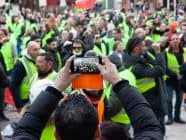Sankt Galler Tagblatt, November 10, 2008
A conference explores the ramifications of work-related trauma in the field of journalism.
Trauma is part of everyday life in journalism. And afterwards, what traces of disaster are left behind in the lives of journalists? This question rests at the core of a recent journalism conference.
“One has the right not to be traumatized when reporting about traumatizing events,” says Gregor Sonderegger, Russian correspondent for Swiss television.
At a conference held by the Quality in Journalism Association last November, Sonderegger explained that in September of 2004, he reported through a hail of bullets at a school in Beslan, where hundreds of hostages (pupils, parents, teachers) were held. “It was as if I were in a tunnel, I simply reported.” Then he wasn’t yet a father, today, he assumes, it would be harder to remain unaffected.
Learn from the police
Documenting trauma from within is a daily requirement not only for foreign and war correspondents, but for local reporters as well. “I am not directly concerned, my experiences are rather secondhand, create distance,” explains court reporter Thomas Hasler of the Tages-Anzeiger. However, he views autopsy photos of small children; he studies files that elaborate meticulously on what humans are capable of; he hears descriptions of terrible crimes and interviews criminals and victims. Three out of four local news journalists are often confronted with traumatizing experiences – deadly accidents, crashes, disasters.
A lethal accident prompted Urs Schlatter, head of the editorial department for Radio Pilatus, to invite the training officer of the Canton Police in Luzern to train the editorial staff on how to handle traumatic situations. The journalist on duty at this accident, unfortunately an inexperienced trainee, returned from the field extremely upset. Her colleagues didn’t know how they should deal with her. Soon after class, the instruction was put to the test when a madman ran over nine road workers near the city of Emmen.
Work-flow as shield
The police training officer introduced the work of the Care Team to the editorial staff. Their motto is, “Prepare yourself for the worst, keep your distance, and afterwards talk about it and attend to your basic needs—drink, shower, try to sleep.”
Typically, most journalists know how to function while on site because work-flow forms an invisible shield. Stress-symptoms afterwards are common, such as the loss of appetite, sleeplessness, poor concentration and exhaustion. Strong feelings of mourning, rage and fear may surface. However, if images of terror persist and sleep simply won’t come, professional help should be sought.
Everyone copes differently. Thomas Hasler often seeks solace by playing the piano and eating sweets. Gregor Sonderegger looks for little escapes. In Beslan, he would occasionally go to a neighboring building for peace and quiet. Middle East reporter André Marty has a network of friends who are immediately concerned if he doesn’t check in every few hours.
“My protection is my assignment,” says Austrian journalist Christian Feurstein. For the ORF show Thema, he interviewed criminals and victims whose stories made news. One was Natascha Kampusch, after she escaped from her tormentor. Another was Gerti Jones, who married an American on deathrow and stayed with him until his execution. “If I have the feeling, I’m useful to the person whom I accompany, or to society. I can immerse myself deeply into their fates,” said Feurstein.
After the brouhaha about Natascha Kampusch, Feurstein was near collapse. He didn’t sleep, didn’t eat and felt burnt out. What was especially difficult for him was that his TV station, ORF, refused to get involved and acted as if he wasn’t emotionally drained. “Take a shower, it’ll do you good,” was the response of a colleague in the editorial office at home, after André Marty phoned to say he was beaten by the police.
Sonderegger had a different experience. His contact person in the editorial department back home inquired how he was coping in Beslan, which helped. “By her asking, I felt I was somehow protected from afar.”
Individual ways of coping
Should these instances prompt media companies to offer systematic support similar to what rescue squads and the military have been offering for decades? Television chief editor Ueli Haldimann insists on individual coping strategies. If you can’t stand the heat, get out of the kitchen; and if you take on a difficult assignment, you do this voluntarily and you have to be prepared for it. Whomever reports from a crisis zone needs experience, must to be physically fit and able to work under pressure. Colleagues are warned not to take any unnecessary risks and cameramen are accompanied by bodyguards. A “care team” or mandatory follow-up assistance is simply unaffordable. Furthermore, journalists must not take themselves too seriously. This attitude causes controversy. Mark Brayne spoke for more sensitivity when he described the diverse nature of traumatic experience. The former BBC war correspondent now works as a psychotherapist.
Thomas Hasler spoke of several trauma cases he became familiar with at the media company Tamedia. In each case the employer initiated help because those concerned couldn’t grasp the depth of their predicament.
Translated by Karin Eberhardt
Tags: Coping, Journalism, stress, Trauma, war














































